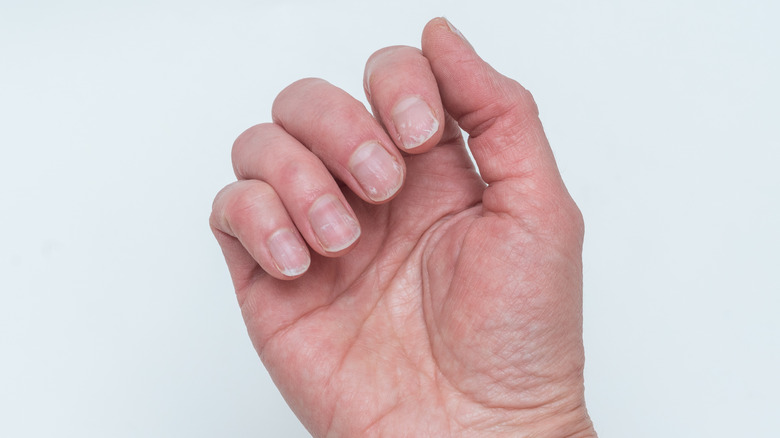What Does It Mean When Your Nails Are Peeling?
Nail peeling is a pretty typical nail complaint, ranking alongside things like discoloration and ridges in its commonality. Because the nails are made up of layers of keratin, the weakening of the nail plate can cause the top layers to split or flake off, sometimes leaving a white patch at the spot of the breakage. Nail peeling can be an annoying occurrence for manicure lovers and nail care enthusiasts alike, so Women spoke exclusively to Dr. Hannah Kopelman, dermatologist at Kopelman Hair Restoration, to learn more about the potential causes of and treatments for nail peeling.
While your nails can indicate things about your overall health, peeling isn't typically a cause for major concern. "In my experience, the most common reason for peeling nails is external stress on the nails," Dr. Kopelman told Women. "Things like frequent handwashing, exposure to cleaning products, or using harsh nail polish removers can really dry out the nail plate and cause it to separate in layers. Even environmental factors like cold weather can make nails more brittle."
That said, there are a few instances when internal factors can be at play in your nail peeling. Dr. Kopelman mentions dietary protein, iron, and biotin deficiencies as potential causes. Nail peeling that is accompanied by other symptoms can also point to underlying health issues like anemia or thyroid imbalance. "So, if someone notices that their nails are persistently peeling and they're feeling fatigued or unwell in other ways, it's worth getting checked out to make sure nothing deeper is going on," she adds.
How to treat and prevent nail peeling
There are many ways to treat nail peeling caused by external stressors or weakened nails, with Dr. Hannah Kopelman, dermatologist at Kopelman Hair Restoration, sharing expert-backed tips with Women. For one, she recommends ensuring your nails are strong and moisturized. "When I'm giving patients advice on this, I always start with hydration," the dermatologist told Women. "A rich hand cream or a good cuticle oil with ingredients like vitamin E or jojoba oil can really help lock in moisture and protect the nail plate." Dr. Kopelman also recommends talking to your doctor about biotin supplements, adding that "a dose of around 2.5 mg daily can improve nail thickness over time."
Additionally, you can also minimize external stress on the nails, both in everyday activities and within nail care routines. "I also recommend wearing gloves when doing dishes or cleaning since prolonged water exposure weakens the nails," our expert continued. While there are important rules to follow when buffing your nails, Dr. Kopelman specifically recommends filing your nails in one direction rather than in a sawing motion to prevent splitting. She mentions that metal tools under the nails can cause trauma, making it another thing to avoid in your routine. "If the issue doesn't improve after a few weeks of these steps, it's a good idea to see a dermatologist to make sure nothing else is contributing to the problem," she concluded.

